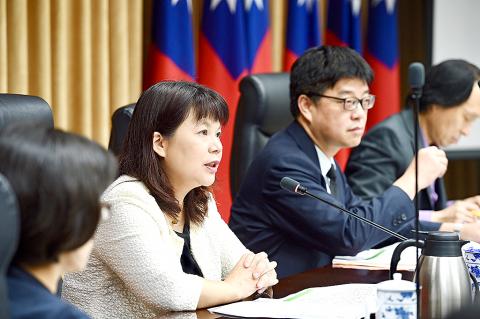Although there are not yet statistics about the impact of China’s 31 measures aimed at attracting Taiwanese professionals and businesses, they still pose a national security risk, the Mainland Affairs Council said in a report yesterday.
Using “equal treatment” and other offers, China’s measures are aimed at enticing Taiwanese to give up their right to “be their own masters,” the report said.
Taiwanese would lose their democracy, freedom and human rights, the report said, calling the 31 measures a “huge challenge” to Taiwan’s national security.

Photo: Peter Lo, Taipei Times
Taiwanese invested US$5.221 billion in China from January to July, a 2.77 percent decrease from the same period last year, the report said, citing statistics from the Ministry of Economic Affairs’ Investment Commission.
Directorate-General of Budget, Accounting and Statistics data showed that 407,000 Taiwanese worked in China in 2016, 13,000 less than in 2015, the report said.
Due to this year’s decline in Taiwanese investments in China, the number of Taiwanese working in China might also continue to decrease, it said.
Since the announcement of the 31 measures, no professors from Taiwan’s public universities or top private universities have taken up teaching positions in China, while the number of private-school teachers and university graduates who have gone to teach in China has been about the same as before, the report said, citing information from the Ministry of Education.
Of the 37,149 students who studied abroad last year, 2,567 — about 6.9 percent — studied in China, the report said.
From January to last month, 108 doctors who said they planned to practice medicine in China applied for a certificate of good standing from the Ministry of Health and Welfare, the report said.
That number was less than half that of last year’s or the 204 who applied in 2016, the report said.
While Beijing is making offers to Taiwanese willing to work in China, at the same time it is ramping up its suppression of Taiwan on the world stage, the report said.
Beijing uses credit score reporting systems and other methods to restrict freedom of speech and business operations, which pose risks for Taiwanese, the report said.
Taiwanese need to be aware of the risks associated with China’s offers, the council said.

‘DENIAL DEFENSE’: The US would increase its military presence with uncrewed ships, and submarines, while boosting defense in the Indo-Pacific, a Pete Hegseth memo said The US is reorienting its military strategy to focus primarily on deterring a potential Chinese invasion of Taiwan, a memo signed by US Secretary of Defense Pete Hegseth showed. The memo also called on Taiwan to increase its defense spending. The document, known as the “Interim National Defense Strategic Guidance,” was distributed this month and detailed the national defense plans of US President Donald Trump’s administration, an article in the Washington Post said on Saturday. It outlines how the US can prepare for a potential war with China and defend itself from threats in the “near abroad,” including Greenland and the Panama

The High Prosecutors’ Office yesterday withdrew an appeal against the acquittal of a former bank manager 22 years after his death, marking Taiwan’s first instance of prosecutors rendering posthumous justice to a wrongfully convicted defendant. Chu Ching-en (諸慶恩) — formerly a manager at the Taipei branch of BNP Paribas — was in 1999 accused by Weng Mao-chung (翁茂鍾), then-president of Chia Her Industrial Co, of forging a request for a fixed deposit of US$10 million by I-Hwa Industrial Co, a subsidiary of Chia Her, which was used as collateral. Chu was ruled not guilty in the first trial, but was found guilty

A wild live dugong was found in Taiwan for the first time in 88 years, after it was accidentally caught by a fisher’s net on Tuesday in Yilan County’s Fenniaolin (粉鳥林). This is the first sighting of the species in Taiwan since 1937, having already been considered “extinct” in the country and considered as “vulnerable” by the International Union for Conservation of Nature. A fisher surnamed Chen (陳) went to Fenniaolin to collect the fish in his netting, but instead caught a 3m long, 500kg dugong. The fisher released the animal back into the wild, not realizing it was an endangered species at

DEADLOCK: As the commission is unable to forum a quorum to review license renewal applications, the channel operators are not at fault and can air past their license date The National Communications Commission (NCC) yesterday said that the Public Television Service (PTS) and 36 other television and radio broadcasters could continue airing, despite the commission’s inability to meet a quorum to review their license renewal applications. The licenses of PTS and the other channels are set to expire between this month and June. The National Communications Commission Organization Act (國家通訊傳播委員會組織法) stipulates that the commission must meet the mandated quorum of four to hold a valid meeting. The seven-member commission currently has only three commissioners. “We have informed the channel operators of the progress we have made in reviewing their license renewal applications, and